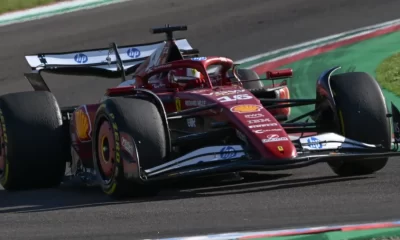Travel
London’s iconic BT Tower is being turned into a hotel after €321m deal – but don’t book just yet
There’s high hopes a revolving restaurant will reopen in the Grade II-listed tower, one of the pointiest landmarks on London’s skyline.
An imposing 189 metres up in the sky, London’s BT Tower doesn’t look like the most hospitable place to rest your head.
But the iconic British landmark is set to be turned into a hotel, it was announced last week.
Current owner BT Group – the multinational telecommunications company formerly known as British Telecom – has agreed to sell the tower to American hotel giant MCR Hotels for £275 million (around €321 million).
“This deal with MCR will enable BT Tower to take on a new purpose, preserving this iconic building for decades to come,” said Brent Mathews, property director at BT Group.
What is the history of the BT Tower?
The 177-metre structure, originally called the Post Office Tower, was completed in 1964 and was London’s tallest building until 1980.
A further section of aerial rigging brought the total height to 189 meters.
The tower was covered in microwave aerials that carried communications across the UK and also housed a rotating restaurant with panoramic views across London.
The restaurant was closed after a 1971 bombing, claimed both by anarchists and the Irish Republican Army (IRA). It never fully reopened to the public, apart from special events and occasional tours.
Technological changes have gradually rendered the tower’s original role in Britain’s telecommunications network obsolete. Its microwave aerials were removed more than a decade ago.
“It’s played a vital role in carrying the nation’s calls, messages and TV signals, but increasingly we’re delivering content and communication via other means,” said Mathews.
When will the BT Tower reopen as a hotel?
MCR Hotels owns about 150 hotels, including the New Yorker Hotel and the modernist TWA Hotel at New York’s JFK airport.
The company said it would work with British architect Thomas Heatherwick on the hotel’s design. The once-futuristic building was given Grade II listed status in 2003.
However, travellers shouldn’t plan on making reservations just yet. The hotel firm said it will “take a number of years” for BT to move out due to the complex equipment on site.
Travel
Spain orders removal of more than 65,000 Airbnb tourist rentals it says violate regulations
ADVERTISEMENT
Spain has launched a major clampdown on Airbnb properties, ordering the removal of over 65,000 holiday rental listings across the country that fail to comply with regulations.
The Spanish Consumer Rights Ministry cited several violations, including missing licence numbers, not specifying whether the owner was an individual or a corporation, and discrepancies between listed information and official records.
The crackdown comes against the backdrop of Spain’s growing housing affordability crisis, which has sparked widespread protests over rising rents and home prices.
Many Spaniards blame short-term rentals on platforms like Airbnb for worsening housing shortages, particularly in popular tourist destinations like Madrid and Barcelona.
‘No more excuses’
On Monday, Spain’s Consumer Rights Minister Pablo Bustinduy said the move aimed to address the general “lack of control” and “illegality” in the holiday rental business.
“No more excuses. Enough with protecting those who make a business out of the right to housing in our country,” he told reporters.
The nationwide enforcement primarily targets listings in Madrid, Andalusia, and Catalonia, where tourism is most heavily concentrated.
The ministry said it had notified Airbnb about the noncompliant listings months ago, but that the company had appealed the move in court.
Spain’s government said Madrid’s high court had backed the order sent to Airbnb.
Bustinduy said it involved the immediate removal of 5,800 rental listings from the site. Two subsequent orders would be issued until the total of 65,935 removals is reached, he said.
Airbnb intends to appeal new ruling
Official data shows Spain had approximately 321,000 licensed holiday rentals as of November last year- a 15 per cent increase since 2020 – with many more operating without proper licenses.
The Consumer Rights Ministry opened an investigation into Airbnb in December last year.
Airbnb told Euronews Travel it will continue to appeal against all decisions linked to this case.
“No evidence of rule-breaking by hosts has been put forward, and the decision goes against EU and Spanish law, and a previous ruling by the Spanish Supreme Court,” a spokesperson said.
“The root cause of the affordable housing crisis in Spain is a lack of supply to meet demand. The solution is to build more homes – anything else is a distraction.”
The spokesperson added that governments across the world are seeing that regulating Airbnb does not alleviate housing concerns or return homes to the market: “It only hurts local families who rely on hosting to afford their homes and rising costs.”
Barcelona bans short-term rentals
Last year, the Spanish government launched a general crackdown on holiday rentals amid growing frustration among residents who say mass tourism is aggravating a housing crisis.
Locals say they are being priced out of their cities due to gentrification and landlords favouring more lucrative short-term tourist lets.
Barcelona has already taken aggressive measures to address the problem, announcing plans to eliminate all 10,000 licensed short-term rental apartments by 2028 to prioritise housing for permanent residents.
Travel
Brits could soon enjoy shorter passport control queues at EU airports. Here’s why
British holidaymakers will soon be able to use e-gates at more EU airports, the UK government has announced.
It comes as part of negotiations between the UK government and the European Union to finalise a ‘post-Brexit reset deal’.
It means British passport holders will no longer have to wait at manned desks and will instead be allowed to use fast-track e-gates usually reserved for EU or European Economic Area citizens.
EU Relations Minister Nick Thomas-Symonds said this would give British travellers “more time to spend on holiday or work trips […] doing what you want, not being stuck in queues.”
The UK government said the move would end “the dreaded queues at border control.”
UK travellers have to join ‘other nations’ queue at EU airports
Following Brexit, UK citizens forfeited their privileged status when travelling to EU countries.
They now fall into the ‘visa-exempt third-country nationals’ category – the same classification as travellers from dozens of countries, including Australia, Canada, New Zealand and Singapore.
This has meant British travellers must join the ‘other nations’ queue at border control rather than using the expedited EU lanes.
The requirement to check that British travellers meet entry conditions is a significant obstacle to allowing them to use the fast-track lanes.
EU border control has to verify that UK travellers are not in breach of the 90-day stay limit in 180 days and that they have the means to return to their country of origin, i.e. a flight ticket out of the EU.
Frontier officials must also stamp the passenger’s passport.
This change often translates to extended waiting times, especially at busy European airports like Amsterdam Schiphol, Milan Malpensa, and Paris Charles de Gaulle.
Waits exceeding an hour have become commonplace, especially when arriving shortly after large international flights.
These delays affect not only entry into EU countries but also departure, as British travellers must undergo exit checks that sometimes result in missed flights due to lengthy queues.
UK travellers will be able to use e-gates at many European airports
Under the new deal, British travellers will be able to take advantage of the faster e-gate passport checks at many EU airports.
No details have yet been released on when this will be introduced and where, although the BBC reported that British Prime Minister Keir Starmer “has called on all EU members to co-operate without delay.”
Some EU airports will likely allow UK travellers to use existing e-gates reserved for EU citizens, while others may install dedicated ‘third-country national’ e-gates.
The latter are already in place across Italy, including Venice Marco Polo and Rome Fiumicino, as well as at Amsterdam Schiphol and Lisbon.
With this system, once the traveller passes through the gate, there is a brief check by border officials who will also stamp passports.
Brits will use e-gates in all airports after introduction of EES
In addition, the UK government underlined that there will be “no legal barriers to e-gate use for British Nationals travelling to and from European Union Member States after the introduction of the European Union Entry/Exit System [EES].”
The EES is scheduled to come into force in October this year. The system will register non-EU visitors who don’t need a visa digitally, removing the need for physical stamps.
New pet passports will make it easier for Brits to bring pets into EU
The UK government also announced that new pet passports will be introduced as part of the deal.
This means UK cats and dogs will be able to travel “more easily” from the UK into the EU by “eliminating the need for animal health certificates for every trip.”
Travel
Brits will soon be able to dodge passport control queues by using e-gates at more European airports
Published on •Updated
ADVERTISEMENT
UK passport holders will soon be able to use e-gates at more EU airports, the UK government has announced.
It comes as part a “breakthrough” post-Brexit reset deal between the UK government and the European Union.
The UK government said the move would end “the dreaded queues at border control” with Brits being allowed to use fast-track e-gates usually reserved for EU or European Economic Area citizens at more airports.
EU Relations Minister Nick Thomas-Symonds said this would give British travellers “more time to spend on holiday or work trips […] doing what you want, not being stuck in queues.”
UK travellers have to join ‘other nations’ queue at EU airports
Following Brexit, UK citizens forfeited their privileged status when travelling to EU countries.
They now fall into the ‘visa-exempt third-country nationals’ category – the same classification as travellers from dozens of countries, including Australia, Canada, New Zealand and Singapore.
This has meant British travellers must join the ‘other nations’ queue at border control rather than using the expedited EU lanes. The requirement to check that British travellers meet entry conditions is a significant obstacle to allowing them to use the fast-track lanes.
EU border control has to verify that UK travellers are not in breach of the 90-day stay limit in 180 days and that they have the means to return to their country of origin, i.e. a flight ticket out of the EU.
Frontier officials must also stamp the passenger’s passport.
This change often translates to extended waiting times, especially at busy European airports like Amsterdam Schiphol, Milan Malpensa, and Paris Charles de Gaulle.
Waits exceeding an hour have become commonplace, especially when arriving shortly after large international flights.
These delays affect not only entry into EU countries but also departure, as British travellers must undergo exit checks that sometimes result in missed flights due to lengthy queues.
UK travellers will be able to use e-gates at many European airports
Under the new deal, British travellers will be able to take advantage of the faster e-gate passport checks at many EU airports.
No details have yet been released on when this will be introduced and where, although the BBC reported that British Prime Minister Keir Starmer “has called on all EU members to co-operate without delay.”
Some EU airports will likely allow UK travellers to use existing e-gates reserved for EU citizens, while others may install dedicated ‘third-country national’ e-gates.
The latter are already in place across Italy, including Venice Marco Polo and Rome Fiumicino, as well as at Amsterdam Schiphol and Lisbon.
With this system, once the traveller passes through the gate, there is a brief check by border officials who will also stamp passports.
Brits will use e-gates in all airports after introduction of EES
In addition, the UK government underlined that there will be “no legal barriers to e-gate use for British Nationals travelling to and from European Union Member States after the introduction of the European Union Entry/Exit System [EES].”
The EES is scheduled to come into force in October this year. The system will register non-EU visitors who don’t need a visa digitally, removing the need for physical stamps.
New pet passports will make it easier for Brits to bring pets into EU
The UK government also announced that new pet passports will be introduced as part of the deal.
This means UK cats and dogs will be able to travel “more easily” from the UK into the EU by “eliminating the need for animal health certificates for every trip.”
-

 EU & the World6 days ago
EU & the World6 days agoWho Is Valeria Marquez? About the Influencer Who Was Shot During Livestream
-

 EU & the World4 days ago
EU & the World4 days agoChris Brown Tour 2025: Updates on Concert Dates, Cities, Ticket Prices & More
-

 EU & the World5 days ago
EU & the World5 days agoWho Is Ben Cohen? About the Ben & Jerry’s Co-Founder Who Was Arrested During Senate Hearing
-

 EU & the World3 days ago
EU & the World3 days agoJosh Freese: 5 Things to Know About the Former Foo Fighters Drummer
-
Travel7 days ago
Crete earthquake: Is it safe to travel to the Greek island following tsunami warning?
-

 EU & the World5 days ago
EU & the World5 days agoChris Brown’s Net Worth: How Much Money He Makes Now
-

 Entertainment4 days ago
Entertainment4 days agoEurovision 2025: Music, Politics, and the Final 26 Set Amid Controversy and Spectacle
-

 Sports4 days ago
Sports4 days agoFerrari, opposing views after first day at Imola for Charles Leclerc and Lewis Hamilton









